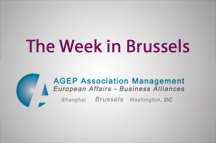 EU top officials embrace charming Putin while Kiev burns
EU top officials embrace charming Putin while Kiev burns
Mr. Putin’s long planned trip to the EU headquarters in Brussels has led to mixed results in the press. Whereas some speak of a “détente”, others prefer to show signs of a chill. Mr. Putin did not accuse the EU of interference in its backyard and obtained bilateral consultations aimed at reassuring Russia on the economic consequences of the EU’s Eastern Partnership initiative.
Launched in 2009, the Eastern Partnership aims to improve EU ties with former Soviet countries. At the end of November, Ukraine President Yanukovich, refused to sign the Association Agreement with the EU. Meanwhile Russia provided him a $15 billion loan and cheaper gas. The rest is known…
At the EU-Russia summit press conference, EU Council President Van Rompuy spoke of the need to overcome “different interpretations and misunderstandings” about the Association agreement. Commission President Barroso stressed the need to work on the “most important strategic and shared objectives” and referred to Putin’s dream of a free trade area from Lisbon to Vladivostok.
According to Putin, the Eastern Partnership countries wanted to develop active relations with the EU while also preserving the close historic and cooperation ties they have with Russia. The EU should, therefore, refrain from creating “new dividing lines”. Talks will continue at technical level.
EU diplomats, however, explained that the Russia-Belarus-Kazakhstan customs Union was not registered with the WTO and was therefore, not abiding by international rules. Since Russia joined the WTO in 2012, the country had become “the champion of protectionism” and the EU was “extremely disappointed”.
Say what you will do; but don’t do what you say. In the meantime Kiev is still burning…
Facing the reality of EU membership: Croatia should cut its budget deficit or face sanctions
Croatia is mired in a deep economic slump. Its gross domestic product has shrunk by 12% since 2008, and unemployment stands at almost 17% of the economically active population. This year, however, should see an economic growth by 0.5%.
Croatia's budget deficit is expected to rise to 6.4% of GDP in 2014 and total public debt is expected to grow to 62% of GDP.
Concerned about these facts, EU finance ministers this week called on Croatia to reduce its deficit to 2.7% of GDP by 2016, as recommended by the Commission, and launched a formal procedure that could lead to sanctions if the EU's newest member state fails to bring its budget deficit within EU limits by 2016.
Finance Commissioner Rehn emphasised that the procedure was “a partnership between Croatia and the EU, and the Commission will work closely with the Croatian authorities”.
Under EU laws, member states must keep their deficits to within 3% of GDP and their overall public debt to 60% of GDP. Eurozone members that fail to address the concerns can be fined 0.2% of GDP. Non-eurozone members such as the UK or Croatia can see their receipt of cohesion funds suspended.
No member state has yet been sanctioned for ignoring the excessive debt procedure.
An event as any other: the European Public Affairs Awards
For the sixth time, the Brussels EU community lives towards the European Public Affairs Awards (EPA Awards) to celebrate excellence and best practice across the industry. It is an event by, for and with the public affairs practitioners in Brussels.
The shortlist has now been published. Many of our colleagues in Brussels are now overwhelmed with e-mails begging to vote for them. The celebration will be held on Wednesday 19 February.












